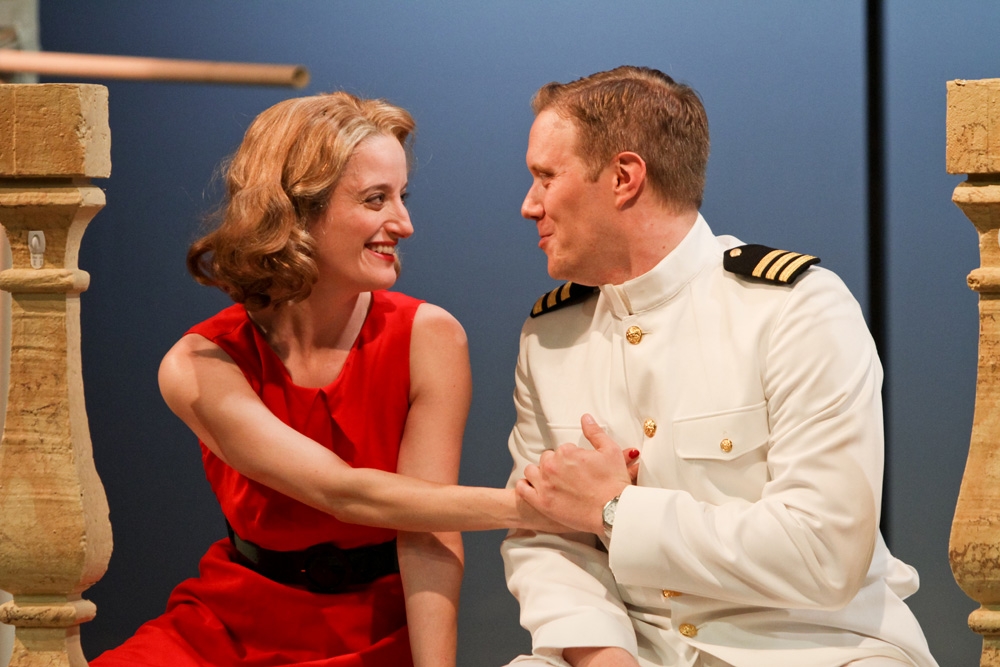The Seattle Shakespeare Company’s delightful adaptation of “Much Ado About Nothing” had me laughing along with my fellow audience mem- bers from start to finish.
William Shakespeare’s classic comedy focuses on the relationships between two pairs of young lovers— Benedick and Beatrice, and Claudio and Hero. Like most of Shakespeare’s comedies, the play—although it does feature conversations regard- ing with profound topics like honor and death—is a lighthearted romp through the trials and tribulations of courtship.

Beatrice (Jennifer Lee Taylor) and spin on Shakespeare’s classic play.
Benedick (Matt Shimkus) have an often humorous chemistry in this ‘50s
Set in a 1953 coastal resort, the Seattle Shakespeare Company’s rendi- tion of the play is a fun, slapstick-style take on the literary classic. Because director George Mount opted to dress his players in 1950s-style dress rather than traditional Shakespearean garb, the play has a modern feel that draws parallels to the classic Hollywood films of the ‘40s and ‘50s. The costumes are complemented by a set that allows the actors to crawl, climb and swim around the stage—at times they even enter the audience.
While the individual performances in the play extend to both ends of the acting spectrum—from the consistent- ly capable Matt Shinkus (Benedick) to the almost unwatchable Noah Greene (Borachio)—I walked away feeling that the collective talent of the cast was admirable. This is due in large part to the easy banter between the characters of Benedick and Beatrice (Jennifer Lee Taylor). Both actors are shrewd, sharp and funny throughout the play. The interplay between the two characters is utterly charming and they seemed to be happiest when bantering with one another. The direction of their scenes together was above par as well, with each of them showing that no matter how quick their tongues may be, their behavior is, at times, really quite childish.
Mount started directing for the stage 20 years ago with an outdoor, Wooden O production of “Much Ado About Nothing.” The play, which is believed to have been published in the last few years of the 16th century, is Mount’s favorite work of the Bard’s.
When asked why he favored this particular play, Mount spoke of its intelligent construction and plot structure.
“There’s a thematic line of knowing thyself that runs through a lot of Shakespeare’s work and this play is no different,” Mount said. “There are characters in [“Much Ado About Nothing”] who know themselves, but not entirely. They tell themselves that marriage is not for them, or that they’re not in love, when the obvious truth is the opposite.”
He went on to talk about the play’s leading couple, Benedick and Beatrice.
“They are two of Shakespeare’s most charming, intelligently constructed characters,” he said. “There’s also great dramatic irony [regarding the rela- tionships] in the play, given that the audience knows more than the players for almost the entire play.”
For the majority of the play, the audience is privy to information that not all of the characters have; humor is drawn from the fact that the play- ers act on bits of half information and are forced into strange situations by this lack of awareness. The audience is moved to laughter at these moments.
Most notable are the scenes in which the bumbling leader of a night watch, Dogberry (David Quicksall) arrests two men attempting to break up Claudio and Hero. In his inepti- tude, Dogberry delays the exposure of the truth and thus Claudio, Hero and all the other players are forced into believing a series of elaborate stories that unsuccessfully try to explain away the events of the play.
When asked what he wanted pro- spective audiences to expect, Mount spoke of having fun and enjoying the play for its comedy.
“I really want the focus to be on having fun. Our adaptation feels a lot like a 1950s screwball comedy and, for that reason, there’s nostalgia to it,” he said. “You get nostalgic when you watch one of those old movies, and the same is true of this play. It’s nostal- gic, but it’s very much alive.”












